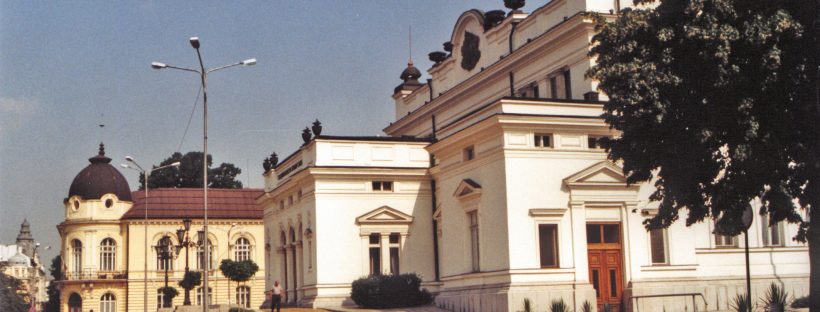On 11 July Bulgarian people will be heading to the poll stations for the second Parliamentary elections in 2021. Following the 4th April elections surprises, new players emerging and fragmented Parliament parties’ inability to form working coalition brought Bulgaria to a new round of elections. By Ekaterina Dimitrova and Viktoriya Dimova
(Eine deutsche Übersetzung des Textes ist weiter unten zu finden.)
As predicted by sociologists GERB (center-right) party ruling the country for the last 7 years, ended up with highest number of seats by winning 26% of people’s vote. As a result of major anti-government protest against Boyko Borissov’s government in summer 2020, and the pandemics, in which Bulgaria suffered second highest COVID-19 death rate in the European Union, GERB lost quite a big number of votes compared to its 33% in 2017 elections. But then comes the surprise. In the last decade GERB was competing with the main opposition party – BSP (Bulgarian Socialist Party). This was not the case in April, though. The Socialists were outwaved by the showman Slavi Trifonov, whose newly formed party (There is such people) took 17% of the votes, compared to the 15% of BSP.
Who is the runner-up Showman?
Slavi Trifonov was an anchor of the late night’s “Slavi’s Show” on Bulgaria’s leading broadcaster for the last 20 years. A graduated musician, producer and an owner of his own TV channel, Slavi is not entirely unknown to politics. In the 90’s turbulent times for the newly born democracy in Bulgaria, Trifonov was part of the student political-satire TV show “Kuku”, from which many activists and new political figures emerged. Slavi continued emboding his political views into his own show, and music career. Slavi’s major breakthrough into politics came in 2016 when he initiated a nation-wide referendum. Though none of the referendum’s proposals in which 2.5 mln Bulgarians cast their votes were implemented by the Parliament, this move was a clear sign for everybody that Trifonov’s entering into Parliamentary elections is just a matter of time. Slavi’s referendum questions served as the core of his programme in 2021 elections:
– Change of electoral system from proportional to majority one (an idea which Trifonov’s MPs surprisingly left out entering the 45th Bulgarian Parliament)
– Decrease in the number of MPs in the National Parliament
– Direct election of national prosecutors
– Decrease in national subsidy for parties to 1 leva per vote (0.50 Euro cents)
– Change in electoral code to ease Bulgarians abroad casting their vote.
Despite this radical changes, Trifonov’s goals in domestic as well as in foreign policy remain unclear.
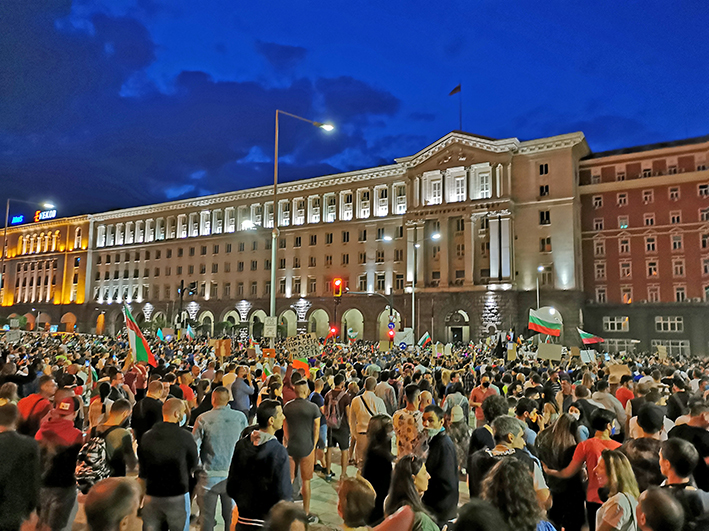
Summer 2020 anti-Borissov protests in Sofia
Final point about Trifonov’s path to the second place in the last elections, which deserves attention is his political campaign. Trifonov’s party candidates did refuse to appear on any major political debates on National TV broadcasters, their main channel of communications with the voters was their own cable TV channel (7/8) and Facebook. Another tool of Trifonov’s throughout the years were his musical concerts, attracting hundreds of thousands of attendees. Trifonov’s pulled out his last ace two days before the elections organizing a major online concert for his supporters. As a result, came not only major domestic support, but also huge amount of votes from Bulgarian diaspora abroad making Trifonov most favorable politician for Bulgarian emigrants.
Surprisingly, shortly before the start of the new electoral campaign on 11th June, Trifonov announced he personally will not be running for MP. However, he implied he might be holding a position in another institution, fueling rumors he is aiming at the Prime Minister’s seat.
Opposition fast failing, and protesting parties’ success
April elections brought mainly disappointment and even caught by surprise the main opposition party of the Bulgarian Socialists. The third place was both shocking, but also could be explained with the turbulence in the leadership of the party and many socialists leaving the party frustrated by Kornelia Ninova (the leader of the party) actions.
On the other hand, activists, who triggered and coordinated summer anti-government protests emerged into the parliamentary picture. “Stand up! Thughs out!” managed to go beyond the 4% barrier. “Democratic Bulgaria” – a union of the Sofia center-right wing, the liberal “Yes, Bulgaria” and the green party increased their votes marked a top result in the capital of Bulgaria.
The Impossible Coalition
Bulgarian Constitutional Law states that the first two parties with the highest public support are given the mandate by the President of the Republic to form the government. Being the first political party in the electoral race, GERB did not proposed Boyko Borissov for a Prime Minister. Instead, the mandate was taken by Daniel Mitov, former member of the center-right “Democrats for a Strong Bulgaria” and a foreign minister from Borissov’s second cabinet. Although, GERB was willing to cooperate with everyone, it seemed that all other parties were united against Borissov’s party, thus, resulting into the inability of GERB to form a forth cabinet. The second mandate was given to Slavi Trifonov’s party, who immediately returned the mandate. In a live Facebook video – the main channel of communication of Slavi Trifonov, he claimed to be following people’s will for a new type of anti-establishment government and the final decision of the Bulgarian people should be spoken again on elections. The third mandate, according to the Bulgarian Constitutional Law shall be decided by the President of the Republic. The President can either give it to the third party with highest poll result or to any other, chosen by the their own. No surprise, the mandate was given by the President Roumen Radev to the third party – Bulgarian Socialists Party.
Summer 2020 anti-Borissov protests in Sofia
The short-lived 45th Bulgarian Parliament was dissolved, and new elections were scheduled for 11 July 2021. Until the summer elections, the country’s governance is into the hands of the caretaker government appointed by the President Radev. The first days of the interim government were marked with immediate changes of key institutional heads. Continuing the motto and the mission of the Parliament for a full revision of Borissov’s ruling, the caretaker government’s actions further exacerbated the institutional crisis and the confrontation between Borissov and Radev.
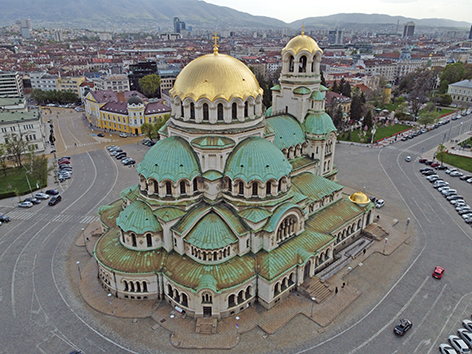
St. Alexander Nevsky Cathedral
All eyes on: Bulgaria and North Macedonia dialogue breaking
Opening of negotiations for North Macedonia’s accession in the EU and the Bulgarian position has been in the spotlight in the last months. The dispute between the two parties concerns cultural issues relating to the Macedonian language and to the nationality of the hero Goce Delcev. (1) In November 2020 Bulgaria blocked the accession talks with North Macedonia. Despite being a promoter of the EU enlargement in the Western Balkans, especially during its EU Presidency in 2018, under Borissov’s cabinet ruling the country blocked its neighboring country path to the EU. Politicians, activists, think-tanks, and NGOs spoke out for wiser moves from both sides. In November 2020 PanEuropa Bulgaria, together with PEU Macedonia published a joint declaration urging the governments and institutions of Bulgaria and North Macedonia to continue with the communication in good faith and overcome any obstacles that might hinder progress of North Macedonia towards our shared European future. Caretaker government continues the same policy, as stated by the President Radev and the caretaker foreign minister Svetlan Stoev.
COVID-19 or Corruption? Which is the Biggest Threat to Our Democratic Freedoms?
In most countries, there is no direct normative definition of corruption. In Bulgaria, the only legal definition of corruption could be found in the laws ratifying the Civil Convention on Corruption of the Council of Europe, and the Anti-Corruption Convention ratified in 2000 and 2007.(2) The study of these Conventions reveals that disciplinary and administrative offenses, misappropriation, and buying of voters remain outside the definition. Following the current scandals in Bulgaria, it is understandable why the media calls Bulgaria the “EU’s mafia state”(3).
The statistics are not very positive. According to Transparency International Index Corruption Perceptions Index (CPI) for 2020, Bulgaria is at the bottom of the EU ranking for non-corruption(4). The first report from Brussels on the rule of law dedicates 26 pages to Bulgaria indicating that major problems remain unresolved(5). The ruling party (GERB) had another understanding of the report, claiming it was “positive and objective”. Other metrics such as the Global Corruption Barometer, the Freedom Barometer, and the WJP Rule of Law Index demonstrate how in Bulgaria there is no rule of law but the rule of corruption.
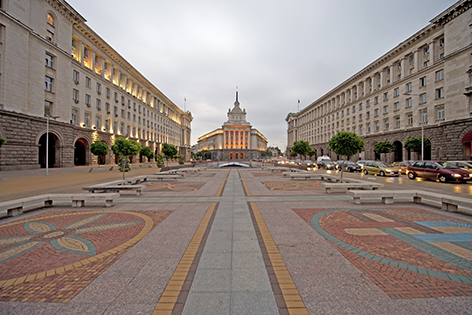
Government District, Sofia
In 2020 for months the streets in Bulgaria were packed every night by protesters. Too many scandals that shook the country remained unresolved, among others: the CCB case(6), ApartmentGate, the 8 dwarfs, ‘Kompromat’Picture of Prime Minister Borissov, Dubai businessman admitting to paying in cash “comfort fee” to former Prime Minister and Finance Minister, organized auctions for pre-selected companies. It seems that there is impunity for everyone with money.
The boutique case of the Bulgarian Development Bank shook up recently the country. Created to support small businesses, the financial institution has distributed loans worth BGN 946 million to only 8 companies related to the business of big oligarchs. We do have now a “Bulgarian Oligarch Bank”.(7)
Last year people tried to express their anger from the erosion of the rule of law, the rampant abuses of power but mostly the fact the government is making a fool of them. Unpunished corruption leads to a sense of impunity. In Bulgaria, there are no general convictions for high-level corruption compared to Romania. The saddest thing is that corruption becomes a norm of social behavior that sometimes is the only alternative for poor people. A country where corruption thrives is a weak country. At some point living in such a country becomes self-sacrifice.
The 2021 Bulgarian parliamentary election resulted in a political deadlock. Bulgaria voted for change and sent three new parties to Parliament. When reading the political party programs what catches the attention is that not all of the parties have a very concrete plan on how to fight corruption and uphold the rule of law.
“Democratic Bulgaria”(8) and “There Is Such a People”(9) want new rules for the functioning of the courts. A new model of the Supreme Judicial Council (SJC) is presented in the programs of “Democratic Bulgaria”, “Stand Up! Thugs Out”(10) and “There is Such a People”. The first two proposed reduction of the parliamentary quota in the SJC to 5 members and “There is Such a People” wants to completely abolish the quota. Closure of Specialized Courts is put forward by “Democratic Bulgaria”, “There is Such a People” and “BSP”.
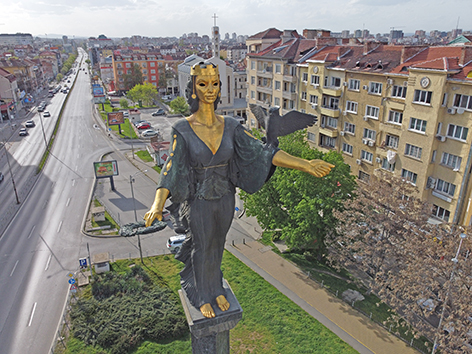
The Statue of Holy Sophia / Sveta Sofia
The Prosecutor’s powers are widely discussed in the programs. Closure of the Office is supported by “Democratic Bulgaria”, “There is Such a People” and “BSP”(11). “Democratic Bulgaria” advance that there should be judicial control over the Prosecutor’s acts related to the criminal proceedings, “There is Such a People” insists on the judicial control over all acts of the prosecution, directly affecting the interests of citizens and “BSP” proposes judicial control over absolutely all acts of the Prosecutor.
Regarding the election of the Chief Prosecutor, “Democratic Bulgaria” proposes a procedure of election by parliament by a three-fifths majority on a proposal from the justice minister. “There is Such a People” wants to introduce the direct election of the Chief Prosecutor. “Democratic Bulgaria” and “Stand Up!Thugs Out” will insist on the need to reduce his term. A procedure for his dismissal at the initiative of the Minister of Justice or one-fifth of the Members of Parliament with a majority of three-fifths of them is suggested by “Democratic Bulgaria”. “Stand Up!Thugs Out” root for early termination of the mandate of the current Chief Prosecutor. An interesting suggestion is the one of “There is Such a People” suggesting to move the prosecution from the Judiciary into a completely separate independent body and establish a Supreme Prosecutorial Council. At the same time, the program of “GERB” could not be found on their website anymore.
Movement for Rights and Freedoms “DPS”(12) does not mention at all concrete judicial or prosecutorial reforms. The judiciary and law enforcement are among the institutions most affected by corruption and there is no real fight against corruption without real solutions.
Although corruption was the key trigger for protests in Bulgaria in 2020, Bulgarians were protesting even in 2019 against the nomination of the current Prosecutor Ivan Geshev: a single candidate with disputable qualities, who is not claimed to be independent and respected. (13)
Without an independent and strong Prosecutor’s Office, there is no way out of the vicious circle. That is why two years later, people are still protesting in front of Sofia Court House demanding the resignation of Chief Prosecutor Ivan Geshev.
The caretaking government-appointed until the July election, appears to be trying to bring transparency and light into the processes, focusing on rule of law and dismissing key institutional leaders.
The 45th National Assembly had a short life and adopted only one law – for changes in the Electoral Code. The most important thing they did was to set up a commission to revise the previous government. This Audit Commission checks the signals of corruption which indicate violations with money from European programs. There are allegations of corruption in the Ministry of Defense, the Ministry of Interior, the State Fund for Agriculture, and the State Reserve. The Prosecutor’s Office launched an investigation into the allegations made in the commission examining how state money has been spent in the last 10 years.
Pressure is applied internationally as well. The EU has a soft approach, intensifying slowly the tone but lacks the backbone in speaking out against corruption directly and taking any measures. However, on the other side of the world, the US opts for more direct approach. On the 2nd of June, Joe Biden’s administration has imposed sanctions under the Global US Magnitsky Act on three Bulgarians and 64 legal entities for their involvement in corruption in Bulgaria. This is a precedent. The decisions to sanction are not made based on speculative or unverified information; measures are usually imposed only in obvious and undoubted cases. The US made clear that some practices are really unacceptable and that “the United States stands with all Bulgarians who strive to root out corruption by promoting accountability for corrupt officials who undermine the economic functions and democratic institutions of Bulgaria(14).
Corruption in Bulgaria has acquired a systemic character. ?he rule of law protects people from corruption only when it is applied correctly. When institutions are not independent the rule of law and democracy are defeated.
Despite, the political problems and lack of effectively working judicial system, Bulgaria enjoys thriving ICT sector, start-up and entrepreneurial community. New generation of well-educated Bulgarians from the world’s top universities, who returned to their home country, are developing exponentially growing business projects abiding the law and the market, sending a clear message that the business sector in Bulgaria can be independent. Civil society, non-governmental sector, and youth organisations are another part of Bulgaria’s beating heart and tireless agents of change.
About the authors:

Ekaterina Dimitrova is a Programme and Project Manager at PanEuropa Bulgaria and a Board member of the Atlantic Club of Bulgaria, Masters of EU Law and Bachelor in International Relations from Sofia University, former editor-in-chief of United Nations Association of Bulgaria media platform – UNA News.

Viktoriya Dimova is Programs and Projects Manager at PanEuropa Bulgaria and the Atlantic Club of Bulgaria, Master of European Law frоm Paris 1 Pantheon-Sorbonne University, France and Master of Arts in European Interdisciplinary Studies from the College of Europe, Poland.
c Photos: Beitragsbild: Parlament in Sofia (Paneuropa Archiv); Protests (Ekaterina Dimitrova), Alexander Nevsky Kathedrale, Government District, Sveta Sofia (European Union 2021 Nikolay Doychinov)
1 https://www.europarl.europa.eu/doceo/document/E-9-2020-006807_EN.html
https://www.rferl.org/a/bulgaria-opposition-north-macedonia-eu-accession/31267364.html
2 Ministry of Foreign Affairs, Corruption, available on: https://www.mfa.bg/bg/ministerstvo/antikoruptsia/koruptsia
3 Ministry of Foreign Affairs, Corruption, available on: https://www.mfa.bg/bg/ministerstvo/antikoruptsia/koruptsia
4 Transparency International, Corruption Perception Index, available on: https://www.transparency.org/en/cpi/2020/index/nzl#
5 Daniel Smilov, „Казват, че докладът за България е положителен. Да видим“, 1 October 2020,available on : https://www.dw.com/bg/%D0%BA%D0%B0%D0%B7%D0%B2%D0%B0%D1%82-%D1%87%D0%B5-
6 https://www.investor.bg/biudjet-i-finansi/333/a/kazusyt-ktb–kakvo-ne-se-sluchi-dosega-182367/
7 Mila Kisiyova, “ББР-едни се развиват, други плащат сметката”, 25 May 2021, available on : https://segabg.com/category-observer/bbr-edni-se-razvivat-drugi-plashtat-smetkata
8 Program of “Democratic Bulgaria”, available on: https://demokrati.bg/program/svoboda-i-spravedlivost/
9 Program of “There is this kind of people”, available on: https://pp-itn.bg/pravosydie/
10 Program of “Stand up !Thugs out“, available on : https://izpravise.bg/programa-2021-2025/
11 Program of “BSP”, available on: https://bsp.bg/files/predizborna-platforma.pdf
12 Program of “DPS”, available on: https://www.dps.bg/izbori-2021/programa.html
13 Daniel Smilov, “Осем причини, поради които Гешев не биваше да бъде избиран”, 24 October 2019, available on : https://www.dw.com/bg/%
14 Todd Prince, U.S. Places Sanctions On Bulgarian Power Broker, Gambling Tycoon, Citing Influence Peddling, 3 June 2021, available on:https://www.rferl.org/a/bulgaria-sanctions-us-peevski-boshkov-zhelyazkov-corruptiion/31287870.html
Bulgarien nach und vor den Wahlen
Für den 11. Juli sind die Bürger Bulgariens zur zweiten Parlamentswahl im Jahr 2021 aufgerufen. Die Wahl vom 4. April brachte einige Überraschungen, neue Spieler tauchten auf, aber die zersplitterten Parlaments-
parteien konnten keine Koalition bilden, sodass es zu einer Neuwahl kommt.
Wie vorausgesagt konnte die seit sieben Jahren regierende Partei GERB (mitte-rechts) mit 26 Prozent die meisten Sitze im Parlament gewinnen. Massive Proteste gegen die Regierung von Boyko Borissov im Sommer 2020, sowie die Pandemie – Bulgarien hatte die zweithöchste Covid-19-Sterberate in der Europäischen Union – führten zu beachtlichen Verlusten von GERB, die 2017 noch 33 Prozent gewinnen konnte. Doch dann kam die Überraschung. Im vergangenen Jahrzehnt stand GERB im Wettbewerb zur größten Oppositionspartei, der Sozialistischen Partei Bulgariens. Aber im April kam es anders. Die Sozialisten wurden vom Showmaster Slavi Trifonov überholt, dessen neu formierte Bewegung „Es gibt ein solches Volk“ 17 Prozent der Stimmen bekam, die Sozialisten kamen auf 15 Prozent.
Wer ist also dieser Showmaster? Slavi Trifonov hatte für 20 Jahre im führenden Fernsehsender Bulgariens seine eigene late night show „Slavi´s Show“. Der ausgebildete Musiker, Produzent und Eigentümer eines eigenen TV-Senders ist allerdings kein Unbekannter in der Politik. In der turbulenten Zeit der 90er Jahre, als Bulgarien eine Demokratie wurde, war Trifonov Teil der studentischen Politik-Satire „Kuku“, aus der mehrere Aktivisten und politische Persönlichkeiten hervorgingen. Slavi begann eine Karriere als Musiker, brachte seine politischen Ansichten aber in seine eigene Show ein.
Sein Durchbruch begann 2016, als er ein landesweites Referendum initiierte. Da kein einziger Vorschlag aus diesem Referendum, das 2,5 Millionen Bulgaren unterzeichnet hatten, vom Parlament umgesetzt wurde, war es für alle Beobachter nur eine Frage der Zeit, wann Trifonov bei Parlamentswahlen antreten würde. Die Forderungen des Referendums bildeten auch den Kern seines Programms für die diesjährigen Wahlen:
– Änderung des Wahlsystems von einem Proportional- zu einem Mehrheitswahlrecht (eine Idee, die Trifonovs Abgeordnete überraschend beim Einzug in das 45. bulgarische Parlament ausgelassen haben)
– Verringerung der Zahl der Abgeordneten im Parlament
– Direktwahl der nationalen Staatsanwälte
– Senkung der staatlichen Zuschüsse für Parteien auf 1 Leva pro Stimme (0,50 Cent)
– Änderung des Wahlgesetzes, um den Bulgaren im Ausland die Stimmabgabe zu erleichtern.
Trotz dieser radikalen Veränderungen bleiben Trifonovs Ziele sowohl in der Innen- als auch in der Außenpolitik unklar.
Ein weiterer Punkt auf Trifonovs Weg zur Nummer 2 bei den Wahlen, der Beachtung verdient, war seine politische Kampagne. Die Kandidaten der Partei haben sich geweigert bei den Hauptwahldebatten im staatlichen Fernsehen aufzutreten. Ihr wichtigster Kommunikationsweg zu den Wählern waren der eigene Kabelsender (7/8) und Facebook. Ein weiteres Instrument waren Trifonovs Konzerte, die im Laufe des Jahres hunderttausende Menschen anzogen. Das letzte Ass das Trifonov aus dem Ärmel zog war ein Online-Konzert für seine Unterstützer, zwei Tage vor der Wahl. Im Ergebnis gab es nicht nur viel Unterstützung im Land, sondern auch eine hohe Zahl von Stimmen der Diaspora. Trifonov ist der beliebteste Politiker unter den Emigranten.
Zur Überraschung kündigte Trifonov kurz vor Beginn des Wahlkampfes für den 11. Juli an, selber nicht für das Parlament kandidieren zu wollen. Er deutete allerdings an, dass er eine Position in einer anderen Institution erreichen könnte, was die Gerüchte beflügelt, wonach er tatsächlich Premierminister werden möchte.
Scheitern der Opposition nutzt Protestparteien
Für die größte Oppositionspartei, die Sozialisten, brachte die Wahl im April eine herbe Enttäuschung. Die Partei war über den dritten Platz schockiert. Allerdings kann das Ergebnis auch durch die Turbulenzen an der Parteispitze erklärt werden. Viele verließen die Partei, weil sie von Parteichefin Kornelia Ninova frustriert wurden.
Auf der anderen Seite konnten Aktivisten, die im Sommer des Vorjahres die Demonstrationen gegen die Regierung ins Leben gerufen hatten, ins Parlament einziehen. „Aufstehen, Gedanken raus“ konnte die vier Prozent Hürde überspringen. „Demokratisches Bulgarien“, eine Union aus Sofias Mitte-Rechts-Partei, der liberalen „Ja, Bulgarien“ und den Grünen konnte insbesondere durch ein sehr gutes Ergebnis in der Hauptstadt einen Stimmenzuwachs erzielen.
Die unmögliche Koalition
Laut bulgarischer Verfassung bekommen die beiden stimmenstärksten Parteien vom Präsidenten das Mandat für eine Regierungsbildung. GERB, die stimmenstärkste Partei, nominierte aber nicht Boyko Borissov als Premierminister, sondern Daniel Mitov, der früher bei der rechten Partei „Demokraten für ein starkes Bulgarien“ war, und im zweiten Kabinett von Borissov als Außenminister diente. Obwohl GERB bereit war mit allen zusammenzuarbeiten, schien es, als seien alle anderen Parteien gemeinsam gegen die Partei von Borissov, was es für GERB unmöglich machte, ein viertes Kabinett zu bilden.
Das zweite Mandat zur Regierungsbildung erhielt Slavi Trifonovs Partei, die das Mandat aber sofort zurücklegte. In einem Live-Video auf Facebook, dem wichtigsten Kommunikationsmittel für Trifonov, erklärte er, der Wille der Bürger sei ein neuer Typ einer Anti-Establishment-Regierung, die Entscheidung dazu sollte in einer neuerlichen Wahl fallen. Über ein drittes Mandat entscheidet laut Verfassung der Präsident. Er kann die drittstärkste Partei, aber auch eine andere Partei, mit einer Regierungsbildung beautragen. Es war aber keine Überraschung, dass die Sozialistische Partei das Mandat erhielt.
Anti-Borissov Proteste im Sommer 2020 in Sofia
Das kurzlebige 45. bulgarische Parlament wurde aufgelöst, und Neuwahlen für den 11. Juli 2021 angesetzt. Bis dahin führt eine Übergangsregierung, ernannt von Präsident Radev, die Geschäfte. Die ersten Tage dieser Übergangsregierung waren durch einen Personalaustausch an den Spitzen einiger Schlüssel-Institutionen gekennzeichnet. Unter Fortsetzung des Mottos und der Mission des Parlaments für eine vollständige Revision von Borissovs Regierung, verschärften die Maßnahmen der Übergangsregierung die institutionelle Krise und die Konfrontation zwischen Borissov und Radev weiter.
Dialog zwischen Bulgarien und Mazedonien
Die Eröffnung der Beitrittsverhandlungen für einen EU-Beitritt von Mazedonien (offiziell nun Nord Mazedonien) und die Haltung Bulgariens dazu, stand in den vergangenen Monaten im politischen Mittelpunkt. Der Streit zwischen den beiden Ländern betrifft kulturelle Fragen, betreffend der mazedonischen Sprache, und der Nationalität des Helden Goce Delcev.1 Im November des Vorjahres hat Bulgarien die Aufnahme von Beitrittsverhandlungen blockiert. Obwohl Bulgarien, speziell während der EU-Ratspräsidentschaft 2018, ein starker Befürworter der Erweiterung in Südosteuropa ist, blockierte die Borissov-Regierung den Weg seines Nachbarlandes in die EU. Politiker, Aktivisten, Think-Tanks und NGOs sprachen sich für eine seriöse Behandlung des Themas aus. Die Paneuropa-Organisationen der beiden Länder veröffentlichten im November 2020 eine gemeinsame Erklärung (siehe Paneuropa 5-6 2020 Seite 23), in der sie die Regierungen und die Institutionen der beiden Länder aufriefen, die Kommunikation im gegenseitigen Vertrauen fortzuführen, und Wege zu suchen, wie man Hindernisse auf dem Weg von Mazedonien in die EU beseitigen kann. Die Übergangsregierung verfolgt die gleiche Politik, wie Präsident Radev und Außenminister Svetlan Stoev festhielten.
Covid-19 oder die Korruption?
In den meisten Ländern gibt es keine direkt normative Definition von Korruption. In Bulgarien ist die einzige legale Definition von Korruption in den Gesetzen zur Ratifizierung der Konvention des Europarates zur Korruption und der Anti-Korruption-Konvention zu finden, die in den Jahren 2000 und 2007 ratifiziert wurde.2 Das Studium dieser Konventionen zeigt, dass Disziplinar- und Ordnungswidrigkeiten, Veruntreuung und Wählerkauf nicht unter die Definition fallen. Betrachtet man die gegenwärtigen Skandale in Bulgarien, so ist nachvollziehbar, warum Bulgarien in den Medien als „EU-Mafia Staat“ bezeichnet wird.3
Die Statistiken zeigen kein positives Bild. Im Korruptions-Index von Transparency International findet sich Bulgarien im EU-Ranking auf den hintersten Plätzen.4 Der erste Brüsseler Bericht zur Rechtsstaatlichkeit widmet Bulgarien 26 Seiten mit dem Hinweis, dass die Hauptprobleme nach wie vor nicht gelöst sind.5 Die Regierungspartei GERB hatte ein anderes Verständnis des Berichts, und behauptete er sei „positiv und objektiv“. Andere Berichte wie Global Corruption Barometer, Freedom Barometer, oder der WJP Rule of Law Index halten fest, dass es in Bulgarien keine Rechtsstaatlichkeit, sondern ein Gesetz der Korruption gäbe.
Im Vorjahr waren die Straßen in Bulgarien über Monate jeden Abend mit Demonstranten gefüllt. Zu viele Skandale, die das Land gebeutelt hatten, blieben unaufgeklärt. Um einige Beispiele zu nennen: der CCB-Fall6, Apartment Gate, das acht Zwerge „Kompromat-Bild“ von Regierungschef Borissov, ein Geschäftsmann aus Dubai, der gestanden hat eine „Komfort-Abgabe“ an den Premierminister und den Finanzminister in bar bezahlt zu haben, organisierte Auktionen für vorausgewählte Unternehmen. Es scheint Straflosigkeit für all jene zu geben, die ausreichend Geld haben.
Eine bulgarische Oligarchen Bank
Jüngst hat der „Boutique-Fall“ der Bulgarischen Entwicklungsbank das Land erschüttert. Ursprünglich für die Unterstützung von kleinen Firmen geschaffen, hat die Finanzinstitution Anleihen in Höhe von 946 Millionen Leva (ungefähr 470 Millionen Euro) an nur acht Unternehmen, die wiederum zum Geschäft der großen Oligarchen gehören, vergeben. Nun gibt es eine „Bulgarische Oligarchen-Bank“.7
Voriges Jahr haben die Leute versucht, ihrer Wut über die Erosion der Rechtsstaatlichkeit, den grassierenden Machtmissbrauch, aber vor allem die Tatsache, dass die Regierung sie zum Narren hält, Ausdruck zu verleihen. Ungestrafte Korruption führt zu einem Gefühl der Straflosigkeit. In Bulgarien gibt es im Vergleich zu Rumänien keine allgemeinen Verurteilungen wegen Korruption auf hoher Ebene. Das Traurigste ist, dass Korruption zu einer Norm sozialen Verhaltens wird, die für arme Menschen manchmal die einzige Alternative ist. Ein Land, in dem Korruption gedeiht, ist ein schwaches Land. Irgendwann wird das Leben in einem solchen Land zur Selbstaufopferung.
Viele Vorschläge zur Reform der Justiz
Die bulgarische Parlamentswahl 2021 führte zu einem politischen Stillstand. Bulgarien stimmte für eine Änderung und schickte drei neue Parteien ins Parlament. Bei der Lektüre der Parteiprogramme fällt auf, dass nicht alle Parteien einen sehr konkreten Plan zur Korruptionsbekämpfung und zur Wahrung der Rechtsstaatlichkeit haben
„Demokratisches Bulgarien“8 und „Es gibt ein solches Volk“9 wollen neue Regelungen für die Gerichte. „Demokratisches Bulgarien“, „Aufstehen, Gedanken raus“10 und „Es gibt ein solches Volk“ haben ein neues Modell für einen Obersten Justizrat präsentiert. Die ersten beiden Gruppen wollen die parlamentarische Quote in diesem Justizrat auf fünf beschränken, „Es gibt ein solches Volk“ will diese Quote komplett beseitigen. „Demokratisches Bulgarien“, „Es gibt ein solches Volk“ und die Sozialisten wollen die spezialisierten Gerichte schließen.
Die Macht der Staatsanwälte wird in den Programmen breit diskutiert. „Demokratisches Bulgarien“, „Es gibt ein solches Volk“ und die Sozialisten unterstützen die Idee das Büro zu schließen.11 „Demokratisches Bulgarien“ fordert eine gerichtliche Kontrolle über die Handlungen des Staatsanwalts im Zusammenhang mit dem Strafverfahren, „Es gibt ein solches Volk“ besteht auf der gerichtlichen Kontrolle aller Handlungen der Staatsanwaltschaft, die die Interessen der Bürger direkt berühren, und die Sozialisten schlagen eine richterliche Kontrolle über absolut alle Handlungen des Staatsanwaltes vor.
Zur Wahl des Chef-Staatsanwaltes schlägt „Demokratisches Bulgarien“ eine Wahl durch das Parlament mit einer Drei-Fünftel-Mehrheit, auf Basis eines Vorschlags des Justizministers, vor. „Es gibt ein solches Volk“ will eine Direktwahl für diese Position einführen. „Demokratisches Bulgarien“ und „Aufstehen, Gedanken raus“ bestehen auf einer zeitlichen Begrenzung der Funktionsperiode. Seine Abwahl auf Initiative des Justizministers oder einem Fünftel der Abgeordneten mit einer Drei-Fünftel-Mehrheit im Parlament schlägt „Demokratisches Bulgarien“ vor. „Es gibt ein solches Volk“ will ein vorzeitiges Ende des Mandats des jetzigen Chef-Staatsanwaltes. Von „Es gibt ein solches Volk“ kommt auch der Vorschlag, die Staatsanwaltschaft aus der Justiz herauszulösen und in eine seperate unabhängige Institution mit einem obersten Staatsanwaltsrat zu transferieren.
Mittlerweile ist das Programm von GERB auf der Webseite nicht mehr zu finden. Die „Bewegung für Recht und Freiheit“ DPS12 nennt überhaupt keine konkreten Vorschläge zur Reform des Justizwesens und der Staatsanwaltschaft. Justiz und Strafverfolgung sind stark von der Korruption betroffen. Ohne Lösung des Problems gibt es aber keinen echten Kampf gegen die Korruption.
Die Korruption war die Hauptmotivation für die Proteste in Bulgarien im Vorjahr. Schon 2019 protestierten die Menschen gegen den jetzigen Staatsanwalt Ivan Geshev: ein einziger Kandidat mit fraglichen Qualitäten, dem man vorwirft weder unabhängig noch angesehen zu sein.13 Ohne eine unabhängige und starke Staatsanwaltschaft gibt es aber keinen Ausweg aus dem Teufelskreis. Deshalb protestieren jetzt, zwei Jahre später, nach wie vor die Menschen vor dem Gerichtsgebäude in Sofia, und verlangen die Absetzung des Oberstaatsanwaltes Ivan Geshev. Die Übergangsregierung, die bis zu den Wahlen im Juli im Amt ist, scheint zu versuchen, Licht in den Prozess zu bringen und Schlüsselpositionen auszutauschen.
Die 45. Nationalversammlung hatte ein kurzes Leben und verabschiedete nur ein Gesetz – zur Änderung des Wahlgesetzes. Die wichtigste Tat war die Einsetzung einer Kommission zur Revision der vorherigen Regierung. Diese Prüfungskommission prüft die Korruptionsvorwürfe, die auf Verstöße mit Geldern aus europäischen Programmen hinweisen. Es gibt Korruptionsvorwürfe im Verteidigungsministerium, im Innenministerium, im Staatsfonds für Landwirtschaft und in der Staatsreserve. Die Staatsanwaltschaft leitete eine Untersuchung zu den Vorwürfen der Kommission ein, die untersuchte, wie staatliche Gelder in den vergangenen zehn Jahren ausgegeben wurden.
Internationaler Druck: EU redet USA handelt
Auch international wird Druck ausgeübt. Die EU hat einen sanften Ansatz, der den Ton langsam verstärkt, aber es fehlt das Rückgrat, um sich direkt gegen Korruption auszusprechen und Maßnahmen zu ergreifen. Auf der anderen Seite der Welt entschieden sich die USA jedoch für einen direkteren Ansatz. Am 2. Juni hat die Regierung von Joe Biden gegen drei Bulgaren und 64 juristische Personen wegen ihrer Beteiligung an Korruption in Bulgarien Sanktionen gemäß dem Magnitsky Act verhängt. Dies ist ein Präzedenzfall. Die Sanktionsentscheidungen werden nicht auf der Grundlage spekulativer oder ungeprüfter Informationen getroffen; Maßnahmen werden in der Regel nur in offensichtlichen und unzweifelhaften Fällen verhängt. Die USA machten deutlich, dass einige Praktiken wirklich inakzeptabel sind und dass „die Vereinigten Staaten an der Seite aller Bulgaren stehen, die sich bemühen, die Korruption auszurotten, indem sie die Rechenschaftspflicht für korrupte Beamte fördern, die die wirtschaftlichen Funktionen und demokratischen Institutionen Bulgariens untergraben.“14
Korruption hat in Bulgarien einen systemischen Charakter angenommen. Rechtsstaatlichkeit schützt Menschen nur dann vor Korruption, wenn sie richtig angewendet wird. Wenn Institutionen nicht unabhängig sind, sind Rechtsstaatlichkeit und Demokratie besiegt.
Trotz der politischen Probleme und des Fehlens eines effektiv funktionierenden Justizsystems erfreut sich Bulgarien einer florierenden Informations- und Kommunikationstechnologie-Branche, Start-ups und Unternehmergemeinschaft. Eine neue Generation gut ausgebildeter Bulgaren von den besten Universitäten der Welt, die in ihr Heimatland zurückgekehrt sind, entwickelt exponentiell wachsende Geschäftsprojekte, die sich an Gesetz und Markt halten und eine klare Botschaft senden, dass der Wirtschaftssektor in Bulgarien unabhängig sein kann. Zivilgesellschaft, Nichtregierungssektor und Jugendorganisationen sind ein weiterer Teil des pulsierenden Herzens Bulgariens und unermüdliche Akteure des Wandels.
